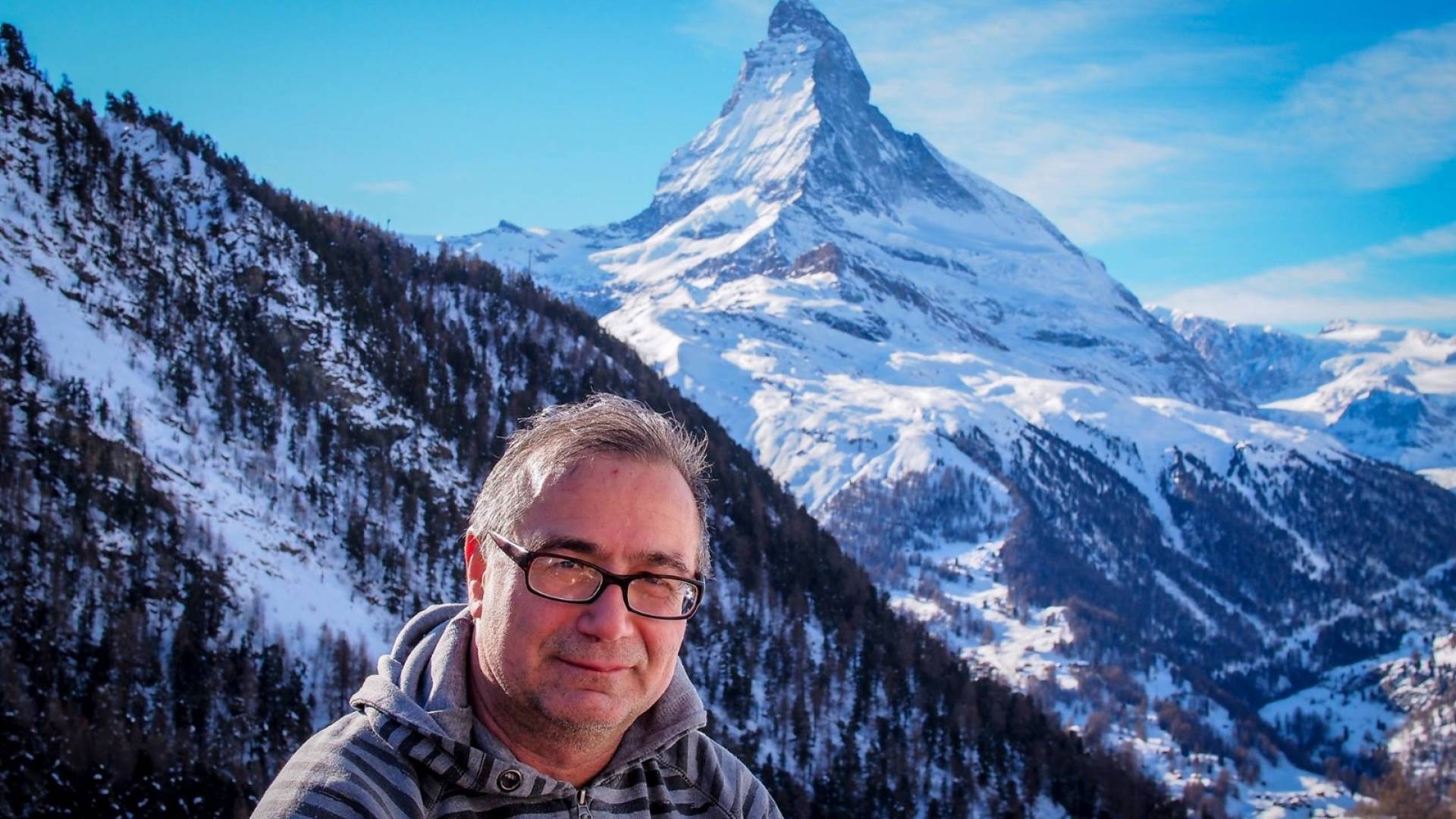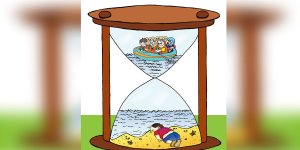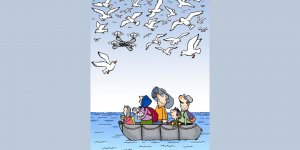Bayram Kaya Wrote HISTORY OF MIGRATION CHAPTER 1
The History of Humanity is the History of Migration. From the early periods of history until today, the world geography has witnessed many migration movements. There are many reasons for migration. Hunger, famine, flood disaster, earthquake, lack of land, insufficient grazing land, unemployment, internal conflicts, civil wars, occupations, despotic governments and external pressures are among the first reasons that come to our minds. These and similar migrations caused many historical destructions, but they also paved the way for the birth of new civilizations and lives...
The phenomenon of migration has derived numerous migration concepts from spoken languages and transferred them to the spoken language. The words "refugee", "refugee", "refugee", "exile", and "migrant"; It is used to describe people on the move who leave the "migrating" countries and cross the borders of TRANSIT countries to reach the "destination country". Migration and movement have identical meanings in this sense. In the old language, the concept of migration is identified with walking. Although “migrant” and “refugee” are often used interchangeably, it is important to distinguish these terms, which have important legal differences. An example can bring up the subject: Migrant or Asylum seeker takes refuge in the destination country. He becomes a refugee when he receives a residence permit. But in this case, it can be "conditional refugee", as well as "temporary protection" and "international protection". All of these are different from each other in terms of stadiums.
In this context, we can divide migrations into many categories:
1-Migrations by Reason
Forced Migration - Voluntary Migration
2-Migrations by volume
Individual and Mass Migrations
3-Immigration by destination country
Internal Migration, Outward Migration, Cross-border Migration
4-Immigration according to legal status
Regular and Irregular Migration
Controlled and Uncontrolled Migration
5-Migrations according to the realization period
Sudden and planned Migration
6-Migrations by length of stay in the destination country
Guest Migration - Seasonal Migration
Temporary, Indefinite and Permanent Migration
And the Internationalization of Migration: The phenomenon of migration is now immanent to the world. Those responsible for migrations are imperialist countries and despotic governments.
The correct method when analyzing migrations is from the specific to the general. We can reach the general understanding of immigrant from a single immigrant. Only in this way can we analyze mass migration and today's migrant influx. We see that migration is internalized into problems such as economic, social, political, cultural and life-property security. Wars, ethnic conflicts, violence, political instability, natural, technological and man-made disasters and desires such as better living, health, education and working conditions are the main causes of migration.
We can write many more types of migration and their reasons, but these examples are enough to understand the characteristics of migration. We do not dwell on what these migrations mean because it is understood from the expression of the concepts. We can also make a further qualification as economic and political migrations. Migrations from Turkey to Germany in the 1960s are economic mass migrations. Immigrants in these years came as temporary and guest workers, but they became permanent. After the junta of March 12 and September 12, even in today's Turkey, we explain the "immigration flows" that concentrated on different countries of the world, especially in Europe, fleeing the persecution of Erdogan's one-man regime, with the concepts of refugees, asylum seekers and asylum seekers. The events of 6-7 September 1955, on the other hand, caused the forced exile of the Greek people from Turkey, which is a forced mass migration. The Exchange Agreement signed between Greece and Turkey in 1923 was an even more serious exile. With this agreement, one and a half million Greek and Turkish Christians were exiled to Greece, while Greece deported 500 thousand Muslims to Turkey. Once again, we witness mass deportations. After these events, millions of people are displaced from their homes. They are homeless and homeless. This is one of the biggest pains of Anatolia.
After this brief information, let's try to open some definitions. We're not going for an original interpretation here. We often adhere to the meanings of concepts under Immigration Laws. However, these concepts are class. It is necessary to think about it and subject it to interpretation. For example, European countries have changed their Immigration Policies recently. Germany has adopted an immigration policy that emphasizes ancestry, while France has adopted an immigration policy that emphasizes culture. Previously, there was an EU Migration Policy based on Multiculturalism. They now put forward the assimilation of immigrants. An organized resistance to assimilation is required.
Who is a Migrant?
There is no internationally accepted legal definition of the word "immigrant". They are defined as people who live outside their home country but are not asylum seekers or refugees. People leave their country through family reunification to live, work, study, or live in another country with family members living abroad. Poverty, political They become immigrants by fleeing their country due to difficult conditions such as turmoil and natural disasters.
Who is a refugee?
A refugee is a person who leaves his/her country because he/she is at risk of serious human rights violations and persecution.
The dynamics of being a refugee and an asylum seeker are different. They cannot continue their lives in their own country because they have suffered from generalized violence and human rights violations, and they leave. Most forced migrants stay in neighboring countries, which are often poor and often economically unstable, as their first place of refuge. They want to migrate to countries with better economic and social opportunities in the future, but this is only possible for a small minority. Immigrants in Turkey, Syrian, Afghan, Iraqi, etc. Immigrants are in this situation. An asylum seeker becomes a refugee when he receives a residence permit.
Who is the asylum seeker?
An asylum seeker is a person who has left his country and sought refuge in another country to be protected from persecution and gross human rights violations, but has not yet been legally recognized as a refugee and is awaiting the outcome of his asylum application. Seeking asylum is a human right.
As a result, this article opened a door to the History of Migration. Current migration movements and policies are often deeply influenced by their historical predecessors. In order to understand today's migrant influx, it is imperative that we know the history of migration well. Practical phenomena that trigger migrations are deep-rooted and deep problems such as economic crises, dictatorial despotic governments in countries, wars, civil wars, climate changes and ecological problems. Wars, conquests, the formation of nations, and the formation of states and empires have brought about migration, whether forced or voluntary. The enslavement and exile of people in conquered areas is a general form of early labor migration.
Since the end of the Middle Ages, the development of European states and the colonization of the rest of the world has accelerated many different forms of international migration. One of the important factors triggering migration is imperialist colonialism.
There have been very destructive migrations in history. For example, the two great states and civilizations of Anatolia, the Hittites and the Luwians, perished as a result of large immigrant influxes. These migrations left the other two great powers of the time, Egypt and Assyria, only in name and collapsed. Recent history Europe experienced devastating migrations, especially in the 18th century, and took drastic measures. This date is the reason why they want the migrations to be controlled and regular today. However, as the poet said: my nation is human kind, my homeland is ruy-i ground. "I am from the nation of humanity, I am from the land of the world". Humanity will reach this consciousness sooner or later as a result of their accumulation. Maybe a thousand years, maybe later, but it will definitely come today.



 Türkçe
Türkçe 


























